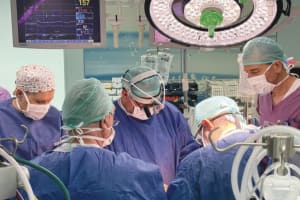Israeli lab-developed miniature human kidney offers new hope for treatments

Researchers at Tel Aviv University’s Sagol Center for Regenerative Medicine (SCRM), in collaboration with the Safra Children’s Hospital at Sheba Medical Center, have successfully grown a miniature human kidney in the lab.
According to recent reports, the tiny organ, known as an “organoid,” was cultivated over a six-month period and replicated the development of a human kidney during gestation. This marks the first achievement of its kind in Israel and represents a significant step forward in the field of regenerative medicine, offering new hope for future kidney-related therapies.
Tel Aviv University Professor Benjamin Dekel, who led the research study at the SCRM, expressed optimism about its future medical applications.
We’ve been able to actually observe how a problem in development can lead to kidney diseases we see in patients,” he explained. “This kind of insight could help us create new treatments in the future.”
Until now, lab-grown kidneys developed from stem cells have typically survived only a few weeks. Researchers also struggled with the presence of unwanted cell types, which hindered the functionality and development of the artificial organs.
Instead, the Israeli research team decided to use stem cells directly retrieved from kidney tissue. This revolutionary approach allowed them to create a robust and purer kidney model that realistically mimics key functions of natural kidneys, such as filters and ducts.
The new research model holds the potential to one day enable scientists to repair or replace damaged kidney tissue using lab-grown cells. Additionally, it may provide valuable insights into how various medications affect fetal kidney development during pregnancy.
“We now have a renewable source of healthy kidney cells and a better understanding of how kidneys form and function,” Dekel said.
Dr. Dror Harats, head of Sheba’s Research Authority, hailed the scientific breakthrough as the latest example of Israel’s prominent role in global medical innovation.
“Despite growing efforts to isolate Israel from international science,” Harats said, “breakthroughs like this prove our impact is both lasting and essential.”
Earlier this year, Newsweek Magazine ranked Israel’s Sheba Medical Center as the eighth best hospital in the world. In 2023, it was ranked among the world’s 20 leading “smart hospitals.”
Click here to learn more about the Sagol Center for Regenerative Medicine at Tel Aviv University.

The All Israel News Staff is a team of journalists in Israel.
You might also like to read this:
















